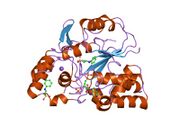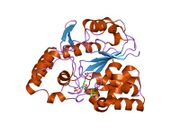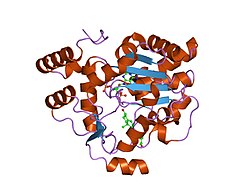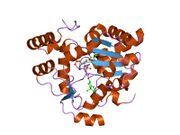Biology:SULT2B1
From HandWiki
Short description: Protein-coding gene in the species Homo sapiens
 Generic protein structure example |
Sulfotransferase family cytosolic 2B member 1 is an enzyme that in humans is encoded by the SULT2B1 gene.[1][2]
Sulfotransferase enzymes catalyze the sulfate conjugation of many hormones, neurotransmitters, drugs, and xenobiotic chemical compounds. These cytosolic enzymes are different in their tissue distributions and substrate specificities. The gene structure (number and length of exons) is similar among family members. This gene sulfates dehydroepiandrosterone but not 4-nitrophenol, a typical substrate for the phenol and estrogen sulfotransferase subfamilies. Two alternatively spliced variants that encode different isoforms have been described.[2]
See also
References
- ↑ "Human hydroxysteroid sulfotransferase SULT2B1: two enzymes encoded by a single chromosome 19 gene". Genomics 53 (3): 284–95. Dec 1998. doi:10.1006/geno.1998.5518. PMID 9799594.
- ↑ 2.0 2.1 "Entrez Gene: SULT2B1 sulfotransferase family, cytosolic, 2B, member 1". https://www.ncbi.nlm.nih.gov/sites/entrez?Db=gene&Cmd=ShowDetailView&TermToSearch=6820.
Further reading
- "Sulfation and sulfotransferases 1: Sulfotransferase molecular biology: cDNAs and genes.". FASEB J. 11 (1): 3–14. 1997. doi:10.1096/fasebj.11.1.9034160. PMID 9034160.
- "Sulfotransferases: genetics and role in toxicology.". Toxicol. Lett. 112-113: 341–8. 2000. doi:10.1016/S0378-4274(99)00214-3. PMID 10720750.
- Glatt H (2001). "Sulfotransferases in the bioactivation of xenobiotics.". Chem. Biol. Interact. 129 (1–2): 141–70. doi:10.1016/S0009-2797(00)00202-7. PMID 11154739.
- "Human cytosolic sulphotransferases: genetics, characteristics, toxicological aspects". Mutat. Res. 482 (1–2): 27–40. 2001. doi:10.1016/S0027-5107(01)00207-X. PMID 11535246.
- "Expression and characterization of the human 3 beta-hydroxysteroid sulfotransferases (SULT2B1a and SULT2B1b)". J. Steroid Biochem. Mol. Biol. 77 (4–5): 261–9. 2001. doi:10.1016/S0960-0760(01)00064-4. PMID 11457664.
- "Biochemical characterization and tissue distribution of human SULT2B1". Biochem. Biophys. Res. Commun. 288 (1): 280–9. 2001. doi:10.1006/bbrc.2001.5746. PMID 11594786.
- "Mutational analysis of human hydroxysteroid sulfotransferase SULT2B1 isoforms reveals that exon 1B of the SULT2B1 gene produces cholesterol sulfotransferase, whereas exon 1A yields pregnenolone sulfotransferase". J. Biol. Chem. 277 (39): 36161–6. 2002. doi:10.1074/jbc.M207165200. PMID 12145317.
- "Differential xenoestrogen-sulfating activities of the human cytosolic sulfotransferases: molecular cloning, expression, and purification of human SULT2B1a and SULT2B1b sulfotransferases". Biochim. Biophys. Acta 1573 (2): 165–70. 2003. doi:10.1016/s0304-4165(02)00416-6. PMID 12399026.
- "Generation and initial analysis of more than 15,000 full-length human and mouse cDNA sequences". Proc. Natl. Acad. Sci. U.S.A. 99 (26): 16899–903. 2003. doi:10.1073/pnas.242603899. PMID 12477932. Bibcode: 2002PNAS...9916899M.
- "Crystal structure of human cholesterol sulfotransferase (SULT2B1b) in the presence of pregnenolone and 3'-phosphoadenosine 5'-phosphate. Rationale for specificity differences between prototypical SULT2A1 and the SULT2BG1 isoforms". J. Biol. Chem. 278 (45): 44593–9. 2004. doi:10.1074/jbc.M308312200. PMID 12923182.
- "Expression of cholesterol sulfotransferase (SULT2B1b) in human platelets". Circulation 109 (1): 92–6. 2004. doi:10.1161/01.CIR.0000108925.95658.8D. PMID 14676143.
- "Complete sequencing and characterization of 21,243 full-length human cDNAs". Nat. Genet. 36 (1): 40–5. 2004. doi:10.1038/ng1285. PMID 14702039.
- "Different subcellular localization of sulphotransferase 2B1b in human placenta and prostate". Biochem. J. 379 (Pt 3): 533–40. 2004. doi:10.1042/BJ20031524. PMID 14741047.
- "The DNA sequence and biology of human chromosome 19". Nature 428 (6982): 529–35. 2004. doi:10.1038/nature02399. PMID 15057824. Bibcode: 2004Natur.428..529G.
- "Expression of cholesterol sulfotransferase (SULT2B1b) in human skin and primary cultures of human epidermal keratinocytes". J. Invest. Dermatol. 122 (5): 1207–13. 2004. doi:10.1111/j.0022-202X.2004.22416.x. PMID 15140224.




